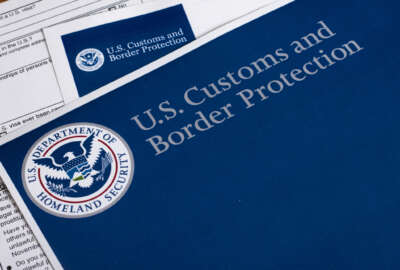The State Department claims success in modernizing its workforce
"Part of our training has gone to deploying diplomats and civil service employees to these subnational programs," said Marcia Bernicat.
A changing world needs a changing State Department. That requires the workforce to keep up. Last month the State Department marked what it called modernization week to summarize and crow a little about how things have changed under Secretary Antony Blinken. The director general of the foreign service and director of global talent, Marcia Bernicat joined the Federal Drive with Tom Temin to review the list.
Interview transcript:
Tom Temin And let’s begin with the basic transformation question relative to a few years ago. State Department has a few more employees FTEs than it did to start with.
Marcia Bernicat That’s correct. And a good chunk of those additional FTEs went to our priority areas, one, to bolstering the workforce that works on all aspects of our relationship with China and the challenges there in. And another good chunk has gone to helping develop more programs to professionally develop our workforce and represent us more thoroughly.
Tom Temin And let’s talk about China, because one of the things that the secretary mentioned when he marked that week of of transformation was something called China House within the State Department. And that sounds like a all of state effort, if you will, to bring to bear on China. What’s that all about and what does it do?
Marcia Bernicat Tom, your characterization is perfect. Modeled in some ways after the old Russia House, the idea was to centralize a set of people who bring diverse skills, not just knowledge about China, which of course is key, not just Chinese language skills, also key, but also people who have a background in high tech, and emerging technologies and in political military issues across the spectrum where they can centralize the work that is being done on this end back here in Washington, on cooperating with China where we can or should, competing where we have to and then countering where we must actions out in the field. But I should also say that China House is aided by a large staff not only deployed in China itself, but China watchers posted around the world because China has been very active in expanding its presence around the globe.
Tom Temin Yes, China is really, I guess, a very different case than Cold War USSR because, yes, it rivals military rivals, hegemony, rivals around the world. But we didn’t do $1 trillion of trade with the Soviet Union like we do with China.
Marcia Bernicat Exactly. And they are, for example, also going to be a key to helping slow the warming of the planet. And so a lot of our efforts, they are a key in helping countering the trade in fentanyl. So, yes, there are a number of things we are compelled to work together on.
Tom Temin I guess we need each other in some deep, fundamental way. And another effort that I wanted to ask you about was the subnational diplomacy unit closer ties with mayors, governors, people you don’t tend to think of except in when they go on economic development trips, junkets, we call them, as being connected that much to the State Department, of all things, federal.
Marcia Bernicat Thank you so much for pointing that out. Part of our training for our new training float has gone to deploying diplomats and civil service employees to these what we call subnational programs. So many of the countries that we interact with in the world are the issues that they face and the solutions that can be found are more analogous to what our governors and our mayors are doing. And a number of the countries I’ve served in, the partnerships they’ve developed with unlikely places like Oregon and Vermont. For Bangladesh and Senegal, there were not only trade issues, which you’re right, a lot of places think of trade first, but also things like police training and developing cultural programs. And so by embedding again, employees for a year or longer in these domestic offices, we can more supercharge those efforts.
Tom Temin We’re speaking with Marcia Bernicat, she’s director general of the Foreign Service and director of global talent at the State Department. And I didn’t see this specifically on the list, but what about strengthening interoperability, if you will, with the Defense Department? I keep recalling something former Secretary Bob Gates said back in the Obama administration, to be better militarily, we need more partnership with State Department. That’s always kind of stuck with me.
Marcia Bernicat Absolutely. Well, I have to say, during especially the war on terror, and I was out in the field for a good part of that time, our U.S. military counterparts were key to helping build the capacity in our host countries. But also in other ways. Actually, before the Gulf Wars, I was serving in Malawi, a country that was emerging from a 30 year dictatorship. And our military deployed humanitarian assistance teams to work with a lot of different elements of Malawi. But the one that really struck me was that they worked with their military counterparts in the war against Aids. And it not only helped transform the military’s role in that country from being an enforcer of a dictator to being a Republican, if you will, with the small army. People could actually see the value that their military could bring to them and literally their lives. So our partnerships have strengthened. We have a number of political advisers from early mid-level employees all the way up to former ambassadors who work side by side with our counterparts in the commands.
Tom Temin And in that idea of modernization, there have been a couple of internal changes or restorations at State for the workforce itself. Two things launched the Policy Ideas Channel and revitalized. That’s Secretary Blinken’s word, the Dissent channel. These sound like internal communications to bubble up things that need bubbling up.
Marcia Bernicat Exactly. And actually, the secretary also revised or revived a third mechanism, the open forum, where speakers are brought in to talk about different aspects. Tom, we have, by design and intention, not only increased our hiring over the last couple of years, but we’ve intentionally gone to every corner of this country to capture the breadth and the and the richness of the American people. We want that same diversity in every sense of the word, not just race and gender represented among our ranks. Why? Because they bring different perspectives, different experiences, different backgrounds to the most complex set of problems that we’ve ever had to deal with in the world. And yes, there are the normal ways of contributing to memos and providing briefings to our decision makers. But these three channels allow people to hear, especially or express contrarian opinion. And the secretary’s really proud of and we are as well, that if you write a dissent channel cable, and by the way, the dissent channel isn’t to just complain about what you don’t like about our policy. It’s your opportunity to say to the secretary, Have you thought about this? How about doing it this way? He reads and approves. He reads every incoming message and he approves every outgoing response to those. I think, we’re a younger force. I mean that mostly by seniority, but you mentioned the hiring at the start. Since March of 2020, and I use that date because that’s when we went into quarantine for COVID. We’ve hired over 2500 Foreign Service officers, the most we’ve hired since 2011. And over a third of our civil service now. And that represents about 25% of our foreign service. About 33% of the civil service also have been hired since that time. That’s a lot of new people who may or may not understand well how foreign policy is made. Not every good ideas adopted. Our policy doesn’t turn on a dime, hardly ever. But we don’t have that ongoing dialog so that people’s minds can be changed, particularly over time. Then we’ll be missing a key element of our very competitiveness.
Tom Temin And just from a standpoint of practicality, you’re using direct hiring authorities more. There’s been some internship programs and those kinds of things to get people in.
Marcia Bernicat Exactly on the civil service side. We’ve gotten direct hire authority from both Congress and OPM such that we are hiring people in the foreign affairs, which is our biggest single, biggest category, and passport examiners. You know the news about how we’ve turned around and our issuing passport. We issued more passports than ever before in history this past fiscal year. We’ve done that because we’ve been able to hire rapidly. We’ve also been hiring specifically human resources officers, data scientists and IT specialists. All three of those skill codes are in fierce demand, are being able to use a direct hire authority, helps us assess and get offers to promising candidates more quickly. On the Foreign Service side where we use examining processes. We’ve moved the entire application and interview processes online, which does a number of things. It allows more assessors to get eyes on to each candidate, but it also means that you are not disadvantaged if you can’t take time off and travel to Washington or to another city to have that interview. We come to you. And so all of these mechanisms have helped us speed and improve our hiring.
Tom Temin All right. So then when do you think all of this will begin to manifest itself in the Best Places to Work rankings? I couldn’t leave that one out.
Marcia Bernicat You are very astute. Well, I am proud to say that we’ve seen a bump up in the most recent survey, but not in the place you might expect. But I do think it reflects the fact that we’ve brought more people in. The place where we showed significant increase and score was in the burden of the workload. I think in the post COVID era, people felt overwhelmed and we were short people. So a lot of people were either doing double duty or doing more than their work requirement said. And in this year’s FEVS, more people said, my workload is reasonable. So we’re on the way back.
Copyright © 2024 Federal News Network. All rights reserved. This website is not intended for users located within the European Economic Area.
Tom Temin is host of the Federal Drive and has been providing insight on federal technology and management issues for more than 30 years.
Follow @tteminWFED






